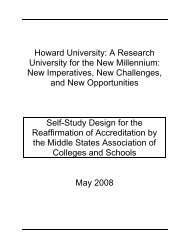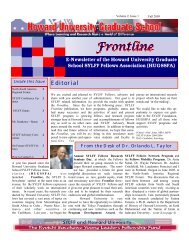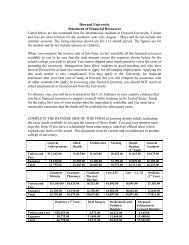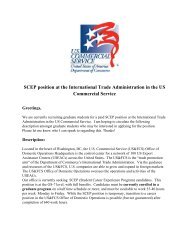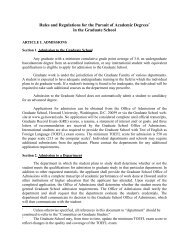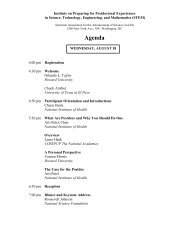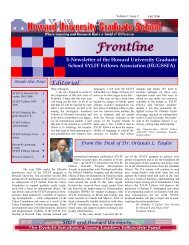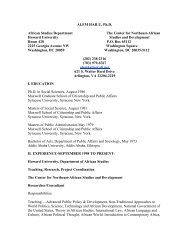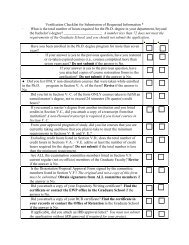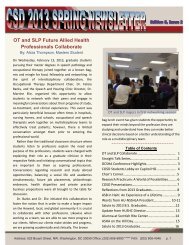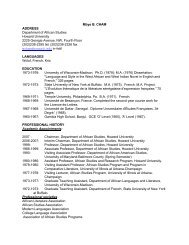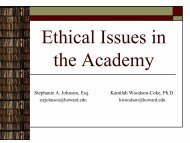Please Click Here For Rules and Regulations - Howard University ...
Please Click Here For Rules and Regulations - Howard University ...
Please Click Here For Rules and Regulations - Howard University ...
You also want an ePaper? Increase the reach of your titles
YUMPU automatically turns print PDFs into web optimized ePapers that Google loves.
<strong>Rules</strong> <strong>and</strong> <strong>Regulations</strong> for the Pursuit of Academic Degrees *<br />
in the Graduate School<br />
ARTICLE I. ADMISSIONS<br />
Section 1. Admission to the Graduate School<br />
Any graduate with a minimum cumulative grade point average of 3.0, an undergraduate<br />
baccalaureate degree from an accredited institution, or any international student with equivalent<br />
qualifications is eligible to apply for admission to the Graduate School.<br />
Graduate work is under the jurisdiction of the Graduate Faculty of various departments.<br />
A student is expected to have adequate undergraduate training in the field in which the individual<br />
plans to do graduate work. If a student's training is found to be inadequate, the individual will be<br />
required to take such additional courses as the department may prescribe.<br />
Admission to the Graduate School does not automatically admit a student to c<strong>and</strong>idacy<br />
for an advanced degree.<br />
Applications for admission can be obtained from the Office of Admissions of the<br />
Graduate School, <strong>Howard</strong> <strong>University</strong>, Washington, D.C. 20059 or via the Graduate School website<br />
at www.gs.howard.edu. No application will be considered complete until official transcripts,<br />
Graduate Record Exam (GRE) scores, a resume, a statement of interest <strong>and</strong>/ or goals, <strong>and</strong> three<br />
letters of recommendation are received by the Graduate School Office of Admissions.<br />
International students are also required to provide the Graduate School with Test of English as<br />
<strong>For</strong>eign Language (TOEFL) exam scores. The minimum TOEFL score for admission is 550 on<br />
the paper scale (213 on the computer scale) † . Individual departments <strong>and</strong> schools may require<br />
additional submissions from the applicant. <strong>Please</strong> contact the departments for any additional<br />
application requirements.<br />
Section 2. Admission to a Department<br />
The department in which the student plans to study shall determine whether or not the<br />
student meets the qualifications for admission to graduate study in that particular department. In<br />
addition to other requested materials, the applicant shall provide the Graduate School Office of<br />
Admissions with a complete transcript of academic performance of work done at <strong>Howard</strong> <strong>and</strong>/or<br />
other institutions of higher education that the applicant has attended. Upon receipt of the<br />
completed application, the Office of Admissions shall determine whether the student meets the<br />
general Graduate School admission requirements. The Office of Admissions shall notify the<br />
department <strong>and</strong> shall request that the department evaluate the student's credentials. The<br />
*<br />
Unless otherwise specified, all references in this document to “department” should be<br />
construed to refer to the “Committee on Graduate Studies.”<br />
†<br />
The Graduate School may, from time to time, update the minimum TOEFL exam score to<br />
reflect changes in the quality <strong>and</strong> coverage of the TOEFL exam.
2<br />
department shall communicate its decision to the Graduate School Office of Admissions, which<br />
will then communicate with the student.<br />
If an applicant is seeking admission into an M.D./ Ph.D. program, the individual must be<br />
accepted into both the College of Medicine <strong>and</strong> the Graduate School. The applicant must meet all<br />
criteria for acceptance into the College of Medicine <strong>and</strong> the Graduate school. Similarly, if an<br />
applicant is seeking admission into an interdisciplinary program or a graduate certificate<br />
program, the rules of admission for the Graduate School <strong>and</strong> participating units will apply.<br />
In those cases where a graduate student wishes to transfer from one graduate program in<br />
the Graduate School to another, he/she must submit an appropriate application to the Office of<br />
Graduate Admissions, <strong>and</strong> receive approval of the department in which he/she wishes to enroll.<br />
Unless approved by the Board of Trustees, a student may not matriculate simultaneously in two<br />
graduate programs.<br />
Section 3. Departmental Admissions Committee<br />
Each department shall have a Departmental Admissions Committee composed of<br />
Graduate Faculty members. This committee <strong>and</strong> other interested departmental faculty members<br />
shall scrutinize the credentials of applicants <strong>and</strong> make recommendations concerning admissions<br />
decisions. Departmental admission decisions are then submitted to the Graduate School. The<br />
Dean or the Dean’s designee will notify the applicant concerning the status of the application.<br />
Section 4. Committee on Graduate Studies<br />
Each department shall have a Committee on Graduate Studies consisting only of current<br />
Graduate Faculty members. The chair of this committee must be a member of the Graduate<br />
Faculty. Among the responsibilities of this committee are the following: (a) the performance of<br />
an annual review of the academic progress of each graduate student in the department; the names<br />
of those students who have been found to be in academic jeopardy shall be reported to the<br />
Graduate School (see also: Article V, Section 4 <strong>and</strong> Article VI, Section 3); <strong>and</strong> (b) the<br />
recommendation to the Dean of external examiners on oral defense committees whose status is<br />
comparable to that of members of the Graduate Faculty who also serve on such committees (see<br />
also: Article V, Section <strong>and</strong> Article VI, Section 8).<br />
Section 5. Categories of Admissions<br />
A. Regular Student<br />
Applicants who meet the stated requirements for admission to a graduate program in the<br />
Graduate School shall be accepted as regular students. Students with a minimum cumulative<br />
grade point average greater to or equal to 3.0 <strong>and</strong> a baccalaureate degree from an accredited<br />
institution, (including any international student with equivalent qualifications,) are eligible to<br />
apply for admission to the Graduate School as a regular student.<br />
B. Provisional Student
3<br />
Applicants who have deficiencies in preparation or scholarship but are judged by the<br />
department to be capable of completing a graduate degree program, may be accepted on a<br />
provisional basis. The student in this category will be allowed to take a maximum of ten (10)<br />
credit hours per semester for a maximum of two semesters <strong>and</strong> shall also satisfy all special<br />
requirements set by the department before the student may qualify for admission as a regular<br />
degree student. Upon review of the conditions established at the time of admission, the<br />
Committee on Graduate Studies may recommend to the Dean that the status of the provisional<br />
student be changed to that of a regular student. Failure to meet requirements of the provisional<br />
admission within two semesters will result in dismissal from the graduate program.<br />
C. Unclassified Student (Non-Degree Student)<br />
An unclassified status is an elected category for the student who wishes to pursue “course<br />
work only.” The applicant must meet all general admission requirements <strong>and</strong> any additional<br />
requirements prescribed by the department. A non-degree student, upon approval <strong>and</strong><br />
recommendation of the department, may qualify for another category of admission in the<br />
Graduate School. Departments will determine the number of non-degree students they can accept<br />
on a yearly basis Students may transfer no more than two (2) courses earned as a non-degree<br />
student to a degree program.<br />
Section 6. Academic Advisement<br />
Each department shall provide faculty advisement for students in the Graduate School.<br />
Departments will assign each incoming student an academic advisor who will assist in academic<br />
planning throughout matriculation <strong>and</strong> development of a Program of Study The student shall also<br />
be given a copy of the departmental h<strong>and</strong>book of course requirements, rules <strong>and</strong> regulations. The<br />
name of each student’s academic advisor must be reported, by the departmental Director of<br />
Graduate Studies ‡ or Graduate Program Director to the Graduate School, within one semester<br />
following the initial registration for graduate study.<br />
Section 7. Readmission to the Graduate School<br />
Any student dismissed for reasons other than the second failure of the comprehensive<br />
examination or the oral defense of the thesis/ the dissertation may seek readmission to the<br />
Graduate School. First, the student must complete an application to the Graduate School Office<br />
of Admissions <strong>and</strong> include a complete record of prior academic performance at <strong>Howard</strong><br />
<strong>University</strong>. Second, the student must submit a written request for readmission to the Dean of the<br />
Graduate School. Third, the student must receive approval for readmission from the Dean of the<br />
Graduate School <strong>and</strong> from the department in which the student wishes to enroll. Reinstatement<br />
requires fulfillment of conditions formulated by the department in which the student is a degree<br />
c<strong>and</strong>idate <strong>and</strong> approved by the Dean. Following approval, the Dean will notify the student of<br />
‡ The departmental Director of Graduate Studies is a member of the Graduate Faculty appointed by the chair of the<br />
department. The appointment of the Director of Graduate Studies must receive the approval of the Dean of the<br />
Graduate School. The appointment is for a term period <strong>and</strong> usually on an annual basis. The Director of Graduate<br />
Studies is the link between the department <strong>and</strong> the Graduate School, <strong>and</strong> among other responsibilities, provides<br />
essential advice <strong>and</strong> mentoring to graduate students. The roles <strong>and</strong> responsibilities of the Director of Graduate<br />
Studies are available in a separate document in the Graduate School.
4<br />
these conditions.<br />
A student who fails the comprehensive examination or the final oral examination in<br />
defense of the thesis or dissertation a second time will be dropped from the Graduate School, <strong>and</strong><br />
is ineligible for readmission. (see: Article VII: Appeal of Academic Decisions).<br />
Returning students who were absent from or not registered at the <strong>University</strong> for one<br />
entire semester (summer session not included) are required to apply for readmission.<br />
Section 8. Pursuit of An Advanced Degree by a Graduate Faculty Member<br />
An individual who holds a current special appointment as a member of the Graduate<br />
Faculty is ineligible to pursue an advanced degree from the Graduate School. Faculty members<br />
may enroll in courses for credit, but such work may not be applied towards fulfillment of<br />
requirements for a graduate degree at <strong>Howard</strong> <strong>University</strong><br />
ARTICLE II. REGISTRATION AND ENROLLMENT<br />
Students must register for classes during the registration period <strong>and</strong> follow procedures for<br />
registration as outlined in the Student Reference Manual <strong>and</strong> Directory of Classes. Both<br />
documents can be found at the <strong>Howard</strong> <strong>University</strong> website, www.howard.edu.<br />
Section 1. Permanent Record<br />
The official permanent record of a student’s enrollment in the university, registration for<br />
classes, grades earned, <strong>and</strong> other qualifications fulfilled are maintained in the Office of the<br />
Registrar.<br />
Section 2. Student Load<br />
Nine credit hours are considered to be a full time schedule for students prior to being<br />
admitted to c<strong>and</strong>idacy. After admission to c<strong>and</strong>idacy, enrollment for at least one credit hour of<br />
dissertation research or dissertation writing may constitute a full time schedule.<br />
The maximum load for a graduate student is fifteen credit hours. Enrollment in more<br />
than twelve credit hours requires approval by the Graduate Studies Committee of the department.<br />
Courses for no credit allowance will not be included as part of the regular student load.<br />
Section 3. Leave of Absence for Exceptional Family Circumstances<br />
In recognition of the effects that childbirth, adoption, illness, caring for incapacitated<br />
dependents (such as children, ill or injured partners, or aging parents), <strong>and</strong> military service may<br />
have on the time <strong>and</strong> energy that graduate students have to devote to their educational programs,<br />
the <strong>University</strong> allows students in such circumstances to apply for a leave of absence of up to two
5<br />
semesters (four semesters in the case of military service) during which time they do not intend to<br />
make academic progress toward the completion of their degree. The time taken on an approved<br />
leave of absence is not included in the time limitations for degree completion <strong>and</strong> advancement<br />
to c<strong>and</strong>idacy.<br />
A. Length of Leave<br />
Application for a leave of absence may be made on a one- or two-semester basis. A leave<br />
of absence ordinarily will not be granted for more than one academic year, except for military<br />
service. Leaves requested for a longer period are approved only in exceptional circumstances. An<br />
approved leave for one semester will be extended to two semesters as needed, if so requested by<br />
the applicant prior to the expiration of the approved one-semester leave of absence.<br />
B. Application Procedures<br />
A leave of absence for childbearing, adoption, illness, or dependent care normally must<br />
be requested <strong>and</strong> approved prior to the beginning of the academic term for which it is being<br />
requested. A letter of request should be addressed to the Dean of the Graduate School <strong>and</strong> should<br />
provide a detailed explanation of the circumstances leading to the request <strong>and</strong> a justification of<br />
the time requested (one semester or one year). The request must be supported by the student's<br />
faculty advisor <strong>and</strong> Director of Graduate Studies. The faculty advisor, Director, <strong>and</strong>/or Graduate<br />
Dean may request a doctor's statement. Approved leaves will stop the student's “time-to-degree<br />
clock.”<br />
C. Special Considerations<br />
1. Registration Requirements<br />
Students on approved leaves of absence are not registered at the <strong>University</strong> <strong>and</strong>,<br />
therefore, do not have the rights <strong>and</strong> privileges of registered students. Students must be<br />
registered during a semester in which they fulfill a <strong>University</strong> or departmental degree<br />
requirement, such as taking qualifying exams or submitting a dissertation/thesis. In<br />
addition, students must also be registered in order to be eligible for any form of<br />
<strong>University</strong> financial aid (e.g., a teaching or research assistantship) <strong>and</strong> to be certified as<br />
full-time students.<br />
2. Impact on Funding<br />
When contemplating a leave of absence, graduate students are advised to consult<br />
the sources of their funding to determine whether a leave might involve a long-term<br />
financial loss. Because academic programs <strong>and</strong> financial aid packages may be<br />
constructed <strong>and</strong> sequenced over a period of years, individual interruptions to the normal<br />
sequence of academic progress <strong>and</strong> scheduled employment may result in a loss of future<br />
funding <strong>and</strong> a slower time to completion of degree. In some programs, a leave of absence<br />
may mean that students may have to begin a new project upon return, with the likelihood<br />
that their research may take longer to complete. Whenever a leave of absence is being<br />
considered, a student should meet with the advisor to develop a plan for resumption of<br />
study <strong>and</strong> gain a clear underst<strong>and</strong>ing of future funding opportunities. Some outside<br />
funding agencies frown on interruptions to a degree program. Some only allow leaves for
6<br />
medical reasons or military service. Others require prior approval of the fellowship<br />
agency.<br />
Students with outst<strong>and</strong>ing educational loans need to consider the effect of taking a<br />
leave of absence on their loan status. <strong>For</strong> some student loans, a grace period for repaying<br />
the loan begins once the student stops registering. If the leave period is longer than the<br />
grace period, then the student may have to begin repaying the loan while on a leave of<br />
absence. Prior to taking a leave, students should arrange to meet with a Student Financial<br />
Aid officer, <strong>and</strong>/or contact their lenders.<br />
4. International students<br />
Non-immigrant F-1 <strong>and</strong> J-1 students <strong>and</strong> their dependents must maintain legal<br />
immigration status at all times. Students with F-1 or J-1 visas must be enrolled full-time<br />
every semester at the <strong>University</strong> while they remain in the United States. The only<br />
possible exception that might allow a student to remain in the United States while on an<br />
approved leave of absence might be a serious illness or medical condition. Students are<br />
advised to consult with the staff of the Office of International Educational Services for<br />
more information when considering a leave of absence.<br />
5. Student Accounts<br />
Students are advised to check with the Enrollment Management Office prior to<br />
taking an approved leave of absence in order to determine the status of their student<br />
accounts. Students are advised that accounts that are overdue will be subject to regular<br />
procedures in accordance with <strong>University</strong> guidelines, notwithst<strong>and</strong>ing any approved leave<br />
of absence: specifically, late fees <strong>and</strong> finance charges will continue to accrue, students<br />
will be blocked from future registration upon their return, <strong>and</strong> accounts will be referred<br />
for collection, with the imposition of additional collection charges, for non-payment in<br />
accordance with regular timeframes.<br />
6. <strong>University</strong> Housing <strong>and</strong> Other Resources<br />
The <strong>University</strong>'s general policy is that students must be registered to be eligible<br />
for <strong>University</strong> housing. <strong>For</strong> specific information about continued eligibility for <strong>University</strong><br />
housing during an approved leave of absence, students are advised to contact the<br />
Department of Resident Life. Students who are on a leave of absence do not have a valid<br />
<strong>Howard</strong> <strong>University</strong> identification card <strong>and</strong> therefore are not entitled to use <strong>University</strong><br />
resources, such as the libraries, shuttle buses, <strong>and</strong> other services covered by m<strong>and</strong>atory<br />
fees.<br />
Section 4. Temporary Interruption of Student's Program for Other Reasons<br />
Students who are readmitted to the Graduate School are subject to the rules <strong>and</strong><br />
regulations in place at the time of readmission.
7<br />
ARTICLE III. GRADES AND COURSE CREDIT<br />
Section 1. Letter Grades <strong>and</strong> Their Value<br />
A. The Grading System<br />
The grading system for all graduate level courses leading to a graduate degree awarded<br />
by the Graduate School shall be as follows:<br />
LETTER GRADE<br />
NUMERICAL VALUE FOR PURPOSES OF<br />
CALCULATING A GRADE POINT AVERAGE (GPA)<br />
A 4.0<br />
A- 3.7<br />
B+ 3.3<br />
B 3.0<br />
B- 2.7<br />
C+ 2.3<br />
C 2.0<br />
C- 1.7<br />
D 1.0<br />
F 0<br />
B. D <strong>and</strong> F Grades<br />
No degree credit may be earned for D <strong>and</strong> F grades received in graduate level courses. Such<br />
courses must be repeated <strong>and</strong> a grade of B- or higher must be earned to satisfy graduate degree<br />
requirements. Grades of D <strong>and</strong> F are a permanent part of the record, however, <strong>and</strong> are used in the<br />
calculation of the cumulative grade point average.<br />
C. Incomplete Grades<br />
All incomplete grades, except those for thesis, dissertation, or research courses, shall<br />
carry an alternate grade designation. The grade "I" with an alternate letter grade indicates that the<br />
work was incomplete at the end of the course. The alternate letter grade indicates the grade that<br />
will be recorded if the work is not completed by the end of the last day of the next semester in<br />
which the student is enrolled. This grade may be given to a graduate student who, upon<br />
petitioning the instructor in writing, has provided adequate justification for partial completion of<br />
the course requirement when the final grade report is due.<br />
Completion of a course in which an incomplete grade has been given will involve the<br />
submission of required documents, e.g., term papers, exams, <strong>and</strong> notebooks, or may also include<br />
completion of contractual period of service not corresponding to the grading period. At the time
8<br />
the alternate letter grade is assigned, the instructor <strong>and</strong> student must complete an Incomplete<br />
Grade Processing <strong>For</strong>m (IGPF) with details of what the student must do <strong>and</strong> by what date in<br />
order to remove/change the incomplete grade. A copy of the IGPF must be placed in the<br />
student’s file in the department office.<br />
The grade of "W" will be reported for a graduate student who withdraws from a course<br />
after the end of the add/drop period according to the <strong>University</strong> calendar. The "W" remains a<br />
permanent part of the student’s academic record.<br />
Section 2. Change of Grade<br />
A grade assigned for work in a graduate level course is not subject to change. Exceptional<br />
cases (such as errors in the computation of final grades) may be considered upon submission of a<br />
petition by the instructor of the course to the Dean of the Graduate School no later than one<br />
month after the beginning of the next semester in which the student is enrolled.<br />
Section 3. Approval for New or Additional Courses<br />
Students may not receive graduate degree credit for courses not duly authorized for this<br />
purpose by the Graduate School.<br />
Section 4. Auditors<br />
A student may audit a graduate level course <strong>and</strong> is required to pay the regular tuition <strong>and</strong><br />
other fees. An auditor is not required to take examinations, <strong>and</strong> will not receive credit for the<br />
course. An audited course will be recorded on the student’s permanent record with an assigned<br />
grade of AD.<br />
Section 5. Undergraduate Courses Taken by Graduate Students<br />
Undergraduate courses taken to fulfill entrance deficiencies will not be calculated into the<br />
grade point average (GPA). Grades earned in required undergraduate courses taken by a graduate<br />
student as a requirement for their program are calculated as a part of both the semester <strong>and</strong><br />
cumulative grade point averages. A maximum of six credits of such courses may be counted<br />
toward a graduate degree with the approval of the department in which the degree is pursued.<br />
Only undergraduate courses in which a grade of "B" or better is earned will be counted toward<br />
the graduate degree.<br />
Section 6. Graduate Courses Taken by Undergraduate Students<br />
A department may permit a <strong>Howard</strong> <strong>University</strong> undergraduate student to take not more<br />
than two graduate courses in his/her senior year. When the credits earned in graduate courses<br />
exceed the total number of credits required for the baccalaureate degree, these credits may, with<br />
department approval, be counted toward requirements for a graduate degree at <strong>Howard</strong><br />
<strong>University</strong>.
9<br />
Section 7. Transfer of Credit to Graduate Degrees<br />
Departments may approve transfer of credits for graduate courses, earned in other<br />
graduate programs, where the grade is B or better. However, it must be the considered judgment<br />
of the department that the work is relevant <strong>and</strong> meets the objectives of comparable courses. In no<br />
case may transfer credit hours exceed the limit specified in Article V., Section 5 (Master’s<br />
degree) <strong>and</strong> Article VI, Section 5 (doctoral degrees) herein. Such transfer may not be used to<br />
satisfy the residency requirement specified in Article V, Section 1A <strong>and</strong> Article VI, Section 1A<br />
<strong>and</strong> must be approved by the Graduate School.<br />
Article IV. OTHER REQUIREMENTS FOR THE DEGREE<br />
In addition to departmental requirements for the degree or certificate, all graduate<br />
students must demonstrate competency in the English language. All graduate students must<br />
participate satisfactorily in the Responsible Conduct of Research (RCR) workshop or equivalent.<br />
Section 1. English Competency <strong>and</strong> Expository Writing<br />
All graduate students must demonstrate their competency in the English language as<br />
evidenced by earning a passing score on the English Proficiency Examination. Students who do<br />
not pass the examination must successfully complete a course on expository writing, “Writing<br />
Workshop in Exposition for Graduate Students.” All graduate students, both part-time <strong>and</strong> full<br />
time, must satisfy this requirement during their first year of enrollment <strong>and</strong> may not advance to<br />
c<strong>and</strong>idacy without having done so. Doctoral students who have demonstrated competency at the<br />
Master’s level at <strong>Howard</strong> <strong>University</strong> need not do so again at the doctoral level.<br />
Section 2. Responsible Conduct of Research<br />
The Responsible Conduct of Research (RCR) Workshop is intended to provide students<br />
with information on pertinent federal <strong>and</strong> <strong>University</strong> guidelines <strong>and</strong> regulations pertaining to the<br />
responsible conduct of research as well as to instruct them in a method of utilizing moral<br />
reasoning skills in responding to ethical dilemmas in research. Workshop topics include<br />
intellectual property data, sharing <strong>and</strong> underst<strong>and</strong>ing of Institutional Review Board (IRB)<br />
policies <strong>and</strong> procedures, data acquisition <strong>and</strong> management, <strong>and</strong> mentoring. The RCR training<br />
workshop is a requirement for admission to c<strong>and</strong>idacy. To receive the RCR certificate, students<br />
must complete all required training sessions <strong>and</strong> successfully complete a learning assessment<br />
exercise at the end of the workshop.<br />
ARTICLE V. GENERAL REQUIREMENTS FOR THE MASTER'S DEGREE<br />
Section 1. Residency, Credit Requirements, <strong>and</strong> Admission to C<strong>and</strong>idacy
10<br />
A. Residency<br />
A minimum of six credit hours per semester constitutes residency. A student must<br />
be in residence in the Graduate School for at least one semester in order to be<br />
recommended for a degree. Credits transferred from other accredited graduate institutions<br />
may not be used to meet the residency requirement.<br />
B. Minimum Credit Requirements<br />
The minimum number of credits required for the Master's degree is thirty.<br />
However, departments may require credits in excess of this amount, <strong>and</strong> various factors<br />
may result in a student’s taking more than the minimum number of credit hours prior to<br />
satisfactorily completing the degree requirements. The completion of minimum course<br />
requirements or credit does not guarantee receipt of the degree.<br />
The distribution of credits for the degree shall be as follows:<br />
1. Twenty-four credits in course work, at least eighteen of which shall be earned<br />
in the major subject.<br />
2. No more than six (6) credits in thesis writing courses may count towards the<br />
requirements of the degree.<br />
C. Admission to C<strong>and</strong>idacy<br />
Admission to a Master’s degree program does not automatically admit a student<br />
to c<strong>and</strong>idacy for the Master’s degree. A student will be admitted to c<strong>and</strong>idacy upon<br />
completion of a majority of the requirements for the Master’s degree, except the thesis or<br />
its equivalent.<br />
Prior to admission to c<strong>and</strong>idacy, a student must:<br />
1. Submit an admission to c<strong>and</strong>idacy form (available from the Graduate School),<br />
listing graduate courses completed, in process, <strong>and</strong> yet to be completed.<br />
2. Pass all of the required core courses.<br />
3. Pass the qualifying or comprehensive examination administered by the<br />
department (where applicable).<br />
4. Demonstrate proficiency in expository writing in addition to satisfying the<br />
RCR requirement as described in Article 1V, above.<br />
5. Pass the foreign language examination or fulfill the approved substitute where<br />
applicable.
11<br />
6. Secure the approval of the Institutional Review Board (IRB), Institutional<br />
Biosafety Committee (IBC), Institutional Animal Care <strong>and</strong> Use Committee<br />
(IACUC) or other institutional committees as required for the research project.<br />
7. Receive approval of a thesis subject or an optional requirement as determined<br />
by the Committee on Graduate Studies in the major department.<br />
8. Receive the endorsement of the Committee on Graduate Studies in the major<br />
department.<br />
9. Receive the approval of the Graduate School.<br />
Admission to c<strong>and</strong>idacy must be achieved at least six weeks prior to the end of the<br />
semester in which the student expects to receive his/her degree.<br />
C<strong>and</strong>idacy for the Master's degree shall be valid for no more than two academic years.<br />
Any student seeking renewal of c<strong>and</strong>idacy must apply to the Graduate School through the<br />
department for reinstatement. The department in which the student is seeking the degree shall<br />
determine the conditions under which he/she may be reinstated, subject to the approval of the<br />
Executive Committee of the Graduate School.<br />
The responsibility for fulfilling these requirements on time is that of the student. The<br />
departmental Director of Graduate Studies should be consulted regarding any of the stated<br />
requirements. Students should carefully note the specific requirements of their department<br />
relative to admission to c<strong>and</strong>idacy <strong>and</strong> regard them as additional to these general requirements.<br />
Section 2. Course Requirements<br />
A. Length of Time for Completion of the Master's Degree<br />
Students are expected to complete a Master's degree within a maximum of five years<br />
from the date of initial registration in the program. Those who have not completed the degree<br />
within that time will be dismissed. Students dropped in this manner may petition for readmission<br />
<strong>and</strong> may be readmitted only upon fulfillment of conditions recommended by the departmental<br />
Committee on Graduate Studies <strong>and</strong> approved by the Executive Committee of the Graduate<br />
School, subject to the rules for readmission to the Graduate School in Article I, Section 7.<br />
B. Course Viability<br />
Credit for courses pursued more than five <strong>and</strong> less than seven years, prior to the term in<br />
which the student presents herself/himself for the final examination may be restored <strong>and</strong> counted<br />
toward the fulfillment of degree requirements. A recommendation to the Dean for course<br />
restoration shall come from the Committee on Graduate Studies. This recommendation must<br />
provide evidence that the student has passed a comprehensive examination in the field in which<br />
the course falls, or a written examination administered expressly for the purpose of restoration of<br />
credits in the course concerned.
12<br />
Under no circumstances, however, may a student receive credit toward the degree for a<br />
course, which the student pursued more than seven (7) years prior to the time the student<br />
presents herself/himself for the final examination.<br />
C. Enrollment in Thesis Writing Courses<br />
A student who has met course credit requirements but is using <strong>University</strong> facilities, or is<br />
conferring in person with the thesis advisor, must continue to enroll in a thesis-writing course. A<br />
student shall register as an auditor if he/she has already accumulated the maximum number of<br />
hours permitted for thesis writing courses.<br />
D. Assignment of Grades for Thesis Writing Courses<br />
Thesis writing courses shall be assigned a grade of Incomplete while the work is in<br />
progress. These incomplete grades are removed after completion of the final oral examination on<br />
the thesis.<br />
E. Enrollment in the Semester in Which the Degree is conferred.<br />
A c<strong>and</strong>idate for a degree must be enrolled in the Graduate School during the semester in<br />
which the degree is conferred.<br />
Section 3. Program of Study<br />
The department in which the student is enrolled shall specify the program <strong>and</strong><br />
departmental requirements for each of its c<strong>and</strong>idates. An approved Program of Study for each<br />
student must be filed with the Graduate School no later than the end of the first semester in<br />
residence. The responsibility of submitting the individualized Program of Study is that of the<br />
student. Failure to do so in a timely manner may result in suspension of enrollment privileges at<br />
the university.<br />
Section 4. Grades <strong>and</strong> Academic Status<br />
A. A cumulative grade point average (GPA) of 3.00 (B) is required for graduation.<br />
B. A student who falls below the 3.00 GPA shall be warned <strong>and</strong> informed by the<br />
Graduate School <strong>and</strong> must raise the quality point index to 3.00 in the next two terms in<br />
residence. Students failing to do so will be dismissed from the Graduate School.<br />
C. A student may earn no more than two grades below B-, or they will be dismissed<br />
from the Graduate School<br />
D. A student who demonstrates an inability to perform satisfactorily at the graduate<br />
level should be recommended for dismissal.
13<br />
Section 5. Transfer of Credit<br />
Course work taken in another graduate program may be approved for transfer up to a<br />
maximum of six credits provided the courses to be transferred were not applied to satisfy<br />
requirements for a degree. The specific courses for which these six credits may be transferred<br />
shall be determined by the Committee on Graduate Studies in the major department subject to<br />
the approval of the Graduate School. Official transcripts must accompany any request for<br />
transfer of credits. Viability of transfer courses shall be governed by the rules specified in<br />
Section 2B above.<br />
Students currently enrolled in a program of the Graduate School who wish to seek<br />
admission to another program in the Graduate School must obtain written permission from the<br />
department in which the student is enrolled for transfer to another program. A copy of the<br />
approved document must be submitted to the Graduate School. The student must formally apply<br />
for admission into the new program. The rules on transfer of credits noted above will apply to<br />
students who desire to switch programs.<br />
Section 6. <strong>For</strong>eign Language Requirement for a Master’s Degree<br />
The department in which the student is enrolled shall determine the foreign language<br />
requirement, if any, or its substitute for the Master’s degree.<br />
Students may satisfy the foreign language requirement by passing an examination<br />
prepared by the foreign language department at <strong>Howard</strong> <strong>University</strong> based on materials submitted<br />
by the department concerned.<br />
Section 7. Qualifying <strong>and</strong>/or Comprehensive Examination<br />
Graduate departments require that students pass a qualifying <strong>and</strong>/or a comprehensive<br />
examination before they qualify for c<strong>and</strong>idacy. Students must consult their departments for<br />
specific information on the examination(s).<br />
A c<strong>and</strong>idate who fails such an examination on the first try may sit for a second<br />
examination, provided that the second examination not be administered earlier than two months<br />
from the date of the first examination. Failure on the second examination will result in dismissal<br />
from the Graduate School.<br />
Section 8. Thesis or its Equivalent: Committee, Document, <strong>and</strong> Defense<br />
Master's degree programs require the submission of a thesis, or in the case of a non-thesis<br />
equivalent, completion of a project or courses in partial fulfillment of requirements for the<br />
degree. A member of the Graduate Faculty who shall act as his/her advisor must supervise<br />
students preparing a required document. Said advisor must be a member of the department in<br />
which the degree will be granted. Students are advised to consult their departments concerning<br />
requirements <strong>and</strong> options, because departments, in accordance with disciplinary practices,<br />
determine acceptable projects.
14<br />
The subject of the thesis or its equivalent shall be determined as early in the program as<br />
possible.<br />
A. The Committee<br />
The committee for the thesis or its equivalent must consist of the thesis advisor <strong>and</strong> at<br />
least two other members, a majority of whom must be members of the Graduate Faculty at<br />
<strong>Howard</strong> <strong>University</strong>. Each member of the committee is responsible for fully reviewing <strong>and</strong><br />
approving both the process <strong>and</strong> the final document (i.e. the thesis or its equivalent). Final<br />
approval of the thesis or its equivalent in all aspects is the responsibility of the full committee<br />
acting on behalf of the Graduate School.<br />
B. The Document<br />
The document shall be prepared in accordance with the conventions of the discipline,<br />
must be produced by word processor, <strong>and</strong> shall conform to requirements of the Graduate School<br />
as specified in the manual available in the Graduate School.<br />
Thesis students shall deposit three approved copies with the department no later than two<br />
weeks after the date of the final oral examination; these documents along with other supporting<br />
documents will then be forwarded to the Graduate School. Students who fail to comply with this<br />
regulation will be considered to have failed the first oral examination <strong>and</strong> will have to sit for a<br />
second one.<br />
C. Defense<br />
The c<strong>and</strong>idate is required to pass a final oral examination in defense of the thesis or its<br />
equivalent. In accordance with the academic calendar of the Graduate School, the department<br />
must notify the Graduate School to schedule the examination. In scheduling the examination, the<br />
student’s major department shall furnish the names of the members of the oral defense<br />
committee. The examination shall be based primarily on the research, the field of research, <strong>and</strong><br />
related areas of study. The majority of the oral examination committee must be members of the<br />
Graduate Faculty at <strong>Howard</strong> <strong>University</strong>.<br />
The final examination shall be open to members of the faculties of the <strong>University</strong>, <strong>and</strong> to<br />
other persons who may be invited by the c<strong>and</strong>idate's major department <strong>and</strong> by the c<strong>and</strong>idate.<br />
A c<strong>and</strong>idate who fails such an examination on the first try may sit for a second<br />
examination, provided that the second examination not be administered earlier than two months<br />
from the date of the first examination. Failure on the second examination will result in dismissal<br />
from the Graduate School.
15<br />
ARTICLE VI. GENERAL REQUIREMENTS FOR DOCTOR OF PHILOSOPHY<br />
DEGREE<br />
Section 1. Residency, Credit Requirements, <strong>and</strong> Admission to C<strong>and</strong>idacy<br />
A. Residency<br />
A minimum of six (6) credit hours per semester constitutes residency. A student must be<br />
in residence in the Graduate School for at least four (4) semesters in order to be recommended<br />
for a degree. Credits transferred from other accredited graduate institutions may not be used to<br />
meet the residency requirement.<br />
B. Minimum Credit Requirements<br />
The minimum course credits for the degree is 72 graduate credits (inclusive of<br />
dissertation) beyond the bachelor's degree. However, departments may require credits in excess<br />
of this amount, <strong>and</strong> various factors may result in a student’s taking more than the minimum<br />
number of credit hours prior to satisfactorily completing the degree requirements. No more than<br />
twelve (12) credits in dissertation writing courses may count towards the requirements for the<br />
degree. The completion of minimum course requirements or credit does not guarantee receipt of<br />
the degree.<br />
C. Admission to C<strong>and</strong>idacy<br />
Admission to the Ph.D. program does not automatically admit a student to c<strong>and</strong>idacy for<br />
the Ph.D. degree. A student shall be admitted to c<strong>and</strong>idacy upon completion of most<br />
requirements for the Ph.D. degree, except the dissertation.<br />
A student can be admitted to c<strong>and</strong>idacy upon meeting the following requirements:<br />
1. Submit a complete an admission to c<strong>and</strong>idacy form to the Graduate School. It must<br />
include a list of graduate courses completed, those in process, <strong>and</strong> those courses in the<br />
field yet to be completed.<br />
2. Pass all of the required core courses.<br />
3. Pass the qualifying <strong>and</strong>/or comprehensive examination administered by the<br />
department (where applicable).<br />
4. Demonstrate proficiency in expository writing in addition to satisfying the RCR<br />
requirement as described in Article IV above.<br />
5. Pass the foreign language examination or fulfil the approved substitute (where<br />
applicable).
16<br />
6. Secure the approval of the Institutional Review Board (IRB), Institutional Biosafety<br />
Committee (IBC), Institutional Animal Care <strong>and</strong> Use Committee (IACUC) or other<br />
institutional committees as required for the research project.<br />
7. Receive approval of a dissertation topic via a process determined by the Committee<br />
on Graduate Studies in the major department. A copy of the approved dissertation<br />
proposal must accompany the request for the admission to c<strong>and</strong>idacy.<br />
7. Receive the endorsement of the Committee on Graduate Studies in the major<br />
department.<br />
8. Receive the approval of the Graduate School.<br />
Admission to c<strong>and</strong>idacy must be achieved at least one semester prior to that in which the<br />
student expects to receive the degree.<br />
C<strong>and</strong>idacy for the Ph.D. degree shall be valid for no more than five academic years. Any<br />
student seeking renewal of c<strong>and</strong>idacy must apply to the Graduate School through the department<br />
for readmission. The department in which the student is seeking the degree shall determine the<br />
conditions under which the student may be reinstated, subject to approval of the Graduate<br />
School.<br />
The responsibility for fulfilling these requirements is that of the student. Students should<br />
consult the Director of Graduate Studies in their department if in doubt as to any of the<br />
requirements. Students should carefully note the specific requirements of their departments<br />
relative to admission to c<strong>and</strong>idacy <strong>and</strong> regard them as additional to these general requirements.<br />
Section 2. Course requirements<br />
A. Length of Time for Completion of the Ph.D. Degree<br />
Students are expected to complete a Ph.D. degree within a maximum of seven years from the<br />
date of initial registration in the program. Those who have not completed the degree within that<br />
time will be automatically dismissed. Students dropped in this manner may petition for<br />
readmission <strong>and</strong> may be readmitted upon recommendation of the departmental Graduate Faculty<br />
<strong>and</strong> approval by the Executive Committee of the Graduate School, subject to the rules for<br />
readmission to the Graduate School in Article I, Section 7.<br />
B. Course Viability<br />
Credit for courses pursued more than seven <strong>and</strong> less than ten years prior to the term in which<br />
the student presents herself/himself for the final oral examination, may be restored <strong>and</strong> counted<br />
toward the fulfillment of degree requirements. A recommendation to the Dean for course<br />
restoration shall come from the Committee on Graduate Studies. This recommendation must<br />
provide evidence that the student has passed a comprehensive examination in the field in which
17<br />
the course falls, or a written examination administered expressly for the purpose of restoration of<br />
credits in the course concerned.<br />
Under no circumstances, however, may a student receive credit toward the degree for a<br />
course, which the student pursued more than ten (10) years prior to the time the student presents<br />
herself/himself for the final oral examination.<br />
C. Enrollment in Dissertation Writing Courses<br />
A student is not permitted to register for dissertation writing until he or she has been admitted<br />
to c<strong>and</strong>idacy. A student who is using the <strong>University</strong> facilities or is conferring in person with the<br />
dissertation advisor, must continue to enroll in a dissertation writing course. The student must<br />
register as an auditor if he/she has already accumulated the maximum number of hours permitted<br />
for dissertation writing courses (12 credit hours).<br />
D. Assignment of Grades for Dissertation Writing Courses<br />
Dissertation writing courses will be assigned a grade of Incomplete while the work is in<br />
progress. The “incomplete” grades will be removed upon successful passage of the final oral<br />
examination for the dissertation.<br />
E. Enrollment in the Terminal Semester<br />
A degree c<strong>and</strong>idate must be registered for at least one graduate credit hour during the<br />
semester in which the degree is conferred.<br />
Section 3. Grades <strong>and</strong> Academic Status<br />
A. A cumulative grade point average of 3.00 (B) is required for graduation.<br />
B. A Ph.D. student will be permitted only two grades below B-, <strong>and</strong> will be dismissed<br />
after he/she receives a third grade below B-. Grades below B- earned at the Master's level at<br />
<strong>Howard</strong> <strong>University</strong> or elsewhere are not included in this count; the reference here is to grades<br />
below B- in Ph.D. course work done at <strong>Howard</strong> <strong>University</strong>.<br />
C. A student who falls below 3.00 GPA will be given due notice by the Graduate School<br />
that he/she must raise his/her quality point index to 3.00 in the next two terms in residence.<br />
Students failing to do so will be dismissed from the Graduate School.<br />
D. A student who demonstrates an inability to perform satisfactorily at the graduate level<br />
should be recommended for dismissal.<br />
Section 4. Program of Study<br />
Each department in which the student is enrolled shall specify the programs <strong>and</strong> the<br />
requirements for each matriculating degree student. An approved Program of Study for each
18<br />
student must be filed with the Graduate School no later than the end of the first semester in<br />
residence. The responsibility of submitting the individualized Program of Study is that of the<br />
student. Failure to do so in a timely manner may result in suspension of enrollment privileges at<br />
the university.<br />
Section 5. Transfer of Credit to the Ph.D. Degree<br />
Students holding a bachelor’s degree who were admitted directly into the Ph.D. program<br />
may—with the approval of the Committee on Graduate Studies—transfer a maximum of 18<br />
semester credit hours of graduate credits with a grade of B or better into the Ph.D. program.<br />
Students holding a Master's degree from a recognized accredited institution or an equivalent<br />
international institution may transfer no more than 24 graduate course credits with a grade of B<br />
or better into the Ph.D. program, dependent upon approval of the Committee on Graduate<br />
Studies in the major department. Official transcripts must accompany any request for transfer of<br />
credits.<br />
Students currently enrolled in a program of the Graduate School who wish to seek<br />
admission to another program in the Graduate School must obtain written permission from the<br />
department in which the student is enrolled for transfer to another program. A copy of the<br />
approved document must be submitted to the Graduate School. The student must formally apply<br />
for admission into the new program. The rules on transfer of credits noted above will apply to<br />
students who desire to switch programs<br />
Section 6. <strong>For</strong>eign Language Requirement<br />
The department in which the student is enrolled shall determine any foreign language<br />
requirement or its substitute.<br />
Students may satisfy the foreign language requirement by passing an examination<br />
prepared by the foreign language department at <strong>Howard</strong> <strong>University</strong> based on materials submitted<br />
by the department concerned.<br />
Section 7. Ph.D. Qualifying <strong>and</strong>/or Comprehensive Examinations<br />
The student will be required to pass a qualifying <strong>and</strong>/or comprehensive examination<br />
administered by the Graduate Faculty of the department in which the student is enrolled. This<br />
examination will be given only once each semester. A student should take the examination while<br />
earning his/her first 48 credits towards the Ph.D. degree, or as required by the department<br />
concerned. Students must consult their departments for specific information on the<br />
examination(s).<br />
A c<strong>and</strong>idate who fails such an examination on the first try may sit for a second<br />
examination, provided that the second examination not be administered earlier than two months<br />
from the date of the first examination. Failure on the second examination will result in dismissal<br />
from the Graduate School.
19<br />
Section 8. Dissertation Proposal, Committee, Document, <strong>and</strong> Defense<br />
Ph.D. programs require the submission of a dissertation in partial fulfillment of<br />
requirements for the degree. A member of the Graduate Faculty who shall act as the student’s<br />
advisor must supervise students preparing the dissertation document. Said advisor must be a<br />
member of the department in which the degree will be granted. Students are advised to consult<br />
their departments concerning requirements.<br />
A. Dissertation Proposal<br />
The subject of the dissertation shall be determined as early in the program as possible. As<br />
a condition for admission to c<strong>and</strong>idacy, the student must present an approved proposal for his/her<br />
doctoral dissertation research as authorized by his/her advisor <strong>and</strong> members of the dissertation<br />
committee.<br />
The proposal should include an outline of the proposed research including the nature,<br />
scope, <strong>and</strong> significance of the problem, the theory, methodology, <strong>and</strong> a tentative title. A copy of<br />
the approved dissertation proposal must accompany the admission to c<strong>and</strong>idacy form submitted<br />
to the Graduate School. The proposal <strong>and</strong> c<strong>and</strong>idacy application must be approved by at least<br />
four members of the Graduate Faculty with a majority of members from the department.<br />
B. Dissertation Committee<br />
The dissertation committee must consist of the dissertation advisor, at least three other<br />
members of the Graduate Faculty, <strong>and</strong> an external member of comparable stature as determined<br />
by the Committee on Graduate Studies. Each member of the committee is responsible for fully<br />
reviewing <strong>and</strong> approving both the process <strong>and</strong> the final dissertation document. Final approval of<br />
the dissertation, in all aspects, is the responsibility of the full dissertation committee acting on<br />
behalf of the Graduate School.<br />
C. Dissertation Document<br />
The c<strong>and</strong>idate for the Doctor of Philosophy degree is required to present a dissertation,<br />
which is the result of significant <strong>and</strong> sustained research in his/her discipline. The student must<br />
demonstrate ability to organize <strong>and</strong> present effectively the findings <strong>and</strong> results of his/her<br />
research. When completed, it is expected that such research will make a meritorious contribution<br />
to the field of knowledge.<br />
The document shall be prepared in accordance with the conventions of the discipline. The<br />
dissertation must be produced by word processor <strong>and</strong> conform to the requirements of the<br />
Graduate School as specified in the manual available in the Graduate School. Before the final<br />
oral examination is scheduled, the dissertation must be deposited with the Graduate School<br />
according to a schedule established by the Graduate School. The dissertation shall also be<br />
deposited in the department where the student is seeking the Ph.D. degree not later than three<br />
weeks before the date of the final examination for the degree. The c<strong>and</strong>idate shall prepare three
20<br />
copies of the dissertation <strong>and</strong> four copies of the dissertation abstract in accordance with the<br />
prevailing Graduate School guidelines on preparing such documents.<br />
D. Final Oral Examination <strong>and</strong> Defense of the Dissertation<br />
The c<strong>and</strong>idate shall be required to pass a final oral examination in defense of the<br />
dissertation. The examination shall be based primarily on his/her research, the field of his/her<br />
research, <strong>and</strong> related areas of study.<br />
The oral examination committee shall consist of a minimum of five members, four of<br />
whom must be current members of the Graduate Faculty at <strong>Howard</strong> <strong>University</strong>, <strong>and</strong> at least one<br />
of whom shall be from outside the <strong>University</strong> <strong>and</strong> be of comparable stature (see: Article I,<br />
Section 4). Upon the recommendation of the Committee on Graduate Studies in the department<br />
where the degree is earned, the Dean of the Graduate School shall appoint members of the oral<br />
examination committee.<br />
The process for the conduct of the final oral examination shall be as follows:<br />
1. The Committee on Graduate Studies in the major department shall request<br />
permission from the Graduate School to conduct an oral examination, adhering to<br />
the published deadlines. A copy of the approved c<strong>and</strong>idacy form must accompany<br />
the request. Currency of courses as stipulated in Article VI, Section 2B must be<br />
established <strong>and</strong> affirmed in the memor<strong>and</strong>um to request the scheduling of an oral<br />
examination.<br />
2. The Committee on Graduate Studies in the department shall submit to the Dean a<br />
list of recommended examiners.<br />
3. The Dean or his designee shall appoint an examination committee <strong>and</strong> shall notify<br />
each member of the committee of the date, time, <strong>and</strong> place of the examination.<br />
4. The Dean <strong>and</strong> Associate/Assistant Deans of the Graduate School shall be exofficio<br />
members of all oral examination committees.<br />
The final oral examination shall be open to members of the faculty of the <strong>University</strong>, <strong>and</strong><br />
to other persons whom the c<strong>and</strong>idate’s major department or the c<strong>and</strong>idate may invite. Final<br />
approval of the dissertation in all aspects is the responsibility of the full committee acting on<br />
behalf of the Graduate School.<br />
A c<strong>and</strong>idate who fails the oral examination on the first try may sit for a second<br />
examination, provided that the second examination not be administered earlier than two months<br />
from the date of the first examination. Failure on the second examination will result in dismissal<br />
from the Graduate School. A student dismissed for this reason will not be readmitted to the<br />
Graduate School.
21<br />
A department can recommend dismissal of a student who, after failing the dissertation<br />
oral defense the first time, does not resubmit the dissertation <strong>and</strong> present himself/herself for reexamination<br />
within a six-month period.<br />
ARTICLE VII. GENERAL REQUIREMENTS FOR CERTIFICATE PROGRAMS<br />
Certificate programs have been established in the Graduate School to 1) enhance the<br />
marketability of graduate students <strong>and</strong> programs across the university; 2) provide a service to the<br />
community at-large through short-term, academic-based graduate programs; <strong>and</strong> 3) provide<br />
exp<strong>and</strong>ed opportunities for students wishing to further their education for personal or career<br />
advancement.<br />
These programs are of two general types: those intended as enhancements to existing<br />
degree programs, <strong>and</strong> those intended to st<strong>and</strong> alone.<br />
Section 1. Residency <strong>and</strong> Credit Requirements<br />
A. Residency<br />
A minimum of three credit hours per semester constitutes residency. A student must be in<br />
residence in the Graduate School for at least one semester in order to be recommended for a<br />
certificate. Credits transferred from other accredited graduate or undergraduate institutions may<br />
not be used to meet the requirements of a certificate program. Students enrolled in online courses<br />
offered by the Graduate School of <strong>Howard</strong> <strong>University</strong> are considered in-residence for such<br />
courses.<br />
B. Minimum Credit Requirements<br />
The number of credits required for certificate programs will be determined by the<br />
Departments offering the programs, but will generally be 12-18. Students pursuing such<br />
programs must consult the specific departmental requirements.<br />
Section 2. Course Requirements<br />
A. Length of Time for Completion of the Certificate Program<br />
Students must complete a certificate program that is part of a Masters or Ph.D. program<br />
by the time they complete the requirements for the degree. Students must to complete a st<strong>and</strong>alone<br />
certificate program in two calendar years. Those who have not completed the program<br />
within that time will be dismissed. Students dropped in this manner may petition for readmission<br />
<strong>and</strong> may be readmitted only upon fulfillment of conditions recommended by the departmental<br />
Committee on Graduate Studies <strong>and</strong> approved by the Executive Committee of the Graduate<br />
School, subject to the rules for readmission to the Graduate School in Article I, Section 7.<br />
B. Course Viability
22<br />
<strong>For</strong> certificate programs that are included in a degree program, course viability will be<br />
the same as for other courses taken for the degree. St<strong>and</strong>-alone Certificate Programs must be<br />
completed in two calendar years.<br />
Section 3. Grades <strong>and</strong> Academic Status<br />
A. A cumulative grade point average of 3.00 (B) is required for the awarding of a<br />
certificate.<br />
B. A student will be permitted only two grades below B-, <strong>and</strong> will be dismissed after<br />
he/she receives a third grade below B-.<br />
C. A student who falls below 3.00 GPA will be given due notice by the Graduate School<br />
that he/she must raise his/her quality point index to 3.00 in the next two terms in<br />
residence. Students failing to do so will be dismissed from the Graduate School.<br />
D. A student who demonstrates an inability to perform satisfactorily at the graduate level<br />
should be recommended for dismissal.<br />
Section 4. Program of Study<br />
Each department in which the student is enrolled shall specify the programs <strong>and</strong> the<br />
requirements for each matriculating certificate student. An approved Program of Study for each<br />
student must be filed with the Graduate School no later than the end of the first semester in<br />
residence. The responsibility of submitting the individualized Program of Study is that of the<br />
student. Failure to do so in a timely manner may result in suspension of enrollment privileges at<br />
the university.<br />
Section 5. Transfer of Credit to a Certificate Program<br />
Generally, students may not transfer credits from other programs or institutions to a<br />
certificate program.<br />
Students currently enrolled in a program of the Graduate School who wish to seek a<br />
Certificate in the Graduate School must formally apply for admission into the certificate program<br />
<strong>and</strong> obtain written acceptance from the department in which the certificate is offered. A copy of<br />
the approved document must be submitted to the Graduate School.
23<br />
ARTICLE VIII. APPEAL OF ACADEMIC DECISIONS<br />
Grievance procedures § , as detailed under the “Policy on Student Academic Procedures”<br />
in The Student Reference Manual, the H-Book <strong>and</strong> other university publications, are applicable<br />
in the case of challenges to academic decisions. The procedure approved by the Board of<br />
Trustees on April 23, 1994, is as follows:<br />
Section 1. The Informal Process<br />
A. A student who believes that he/she has been aggrieved must first attempt to seek an<br />
informal resolution with the other party involved in the dispute, e.g., a grade dispute<br />
with the instructor.<br />
B. If the student is unable to resolve the dispute with the primary party of the dispute,<br />
then the student is advised to seek the intervention of his or her departmental<br />
chairperson.<br />
C. All disputes, which are not resolved at the departmental level, are then brought to the<br />
Dean’s Office, whereupon the Dean or his/her designee will seek to reach an informal<br />
resolution through mediation between the parties.<br />
D. If mediation at the Dean’s level fails, then the student’s grievance is consigned to the<br />
committee designated by the school/college to address student grievances herein<br />
referred to as the Student Grievance Committee.<br />
Section 2. The <strong>For</strong>mal Process<br />
A. Student grievances, which are consigned to the Student Grievance Committee, must<br />
be specified in writing by the student <strong>and</strong> given to the Dean or his/her designee.<br />
B. The student’s written statement, along with supportive evidence, constitutes a case<br />
document, which will be submitted to each member of the committee.<br />
C. The second party to the dispute is also requested to provide to the office of the Dean<br />
with his or her written account of the matter in dispute, which becomes a part of the<br />
case document that is forwarded to each member of the committee.<br />
D. The Student Grievance Committee is then required to set a date for convening a<br />
meeting to hear the case as expeditiously as possible.<br />
E. After the date has been set, each party to the dispute is sent a certified letter, which<br />
informs him or her of the charges, <strong>and</strong> date of the meeting as well as a statement<br />
requesting his or her presence.<br />
§ The procedures for resolution of grievance matters are subject to revision by the Board of Trustees.
24<br />
F. During the hearing, the student presents his/her case; after, the accused party is<br />
allowed to present the other side. Each side is permitted to have witnesses.<br />
G. Following the hearing, members of the committee after deliberation on their<br />
assessment of the case reach a decision as to how the case should be resolved.<br />
H. The committee’s decision is sent to the Dean of the Graduate School in the form of a<br />
recommendation.<br />
I. The Dean then informs the student in writing of the decision, which may be based<br />
upon the committee’s recommendation or upon a modification of it.



